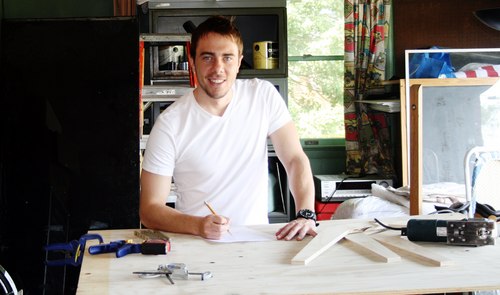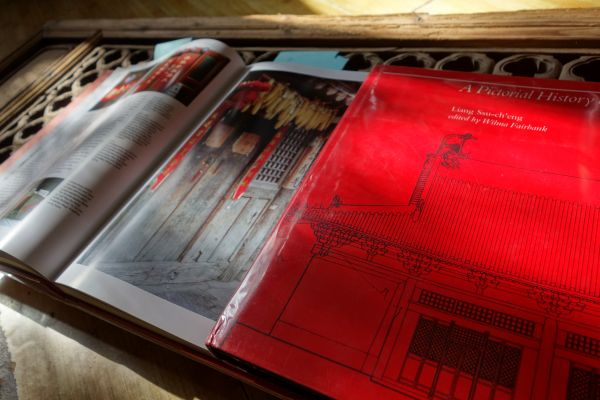
The partition boards were removed by the neighbors. Edward Dumpe III hopes to transform them into tea tables. (Luan Xiang/China Features)
Edward Dumpe III is a young American who came to China in pursuit of his dreams.
Nothing about him matches any part of the narrow, dusty, centuries-old lanes in the heart of Old Beijing: He is blue-eyed, fair-skinned, tall, wide, muscular and obviously foreign.
Yet his dream is to combine the essence of ancient China's classic architectural woodwork with wildly unworldly new ideas to rejuvenate a vanishing Chinese tradition – and promote it worldwide.
He has been learning how to make traditional Chinese wooden furniture – which he says is timeless, but with "extremely complex" structures.
"It's an art," Dumpe says, polishing a dragon-shaped lamppost in his courtyard workshop in short sleeves and a stars-and-bars bandana around his head.
Dumpe lives in the depths of the ancient hutong alleys near the Drum and Bell Towers, symbols of the Chinese capital's 600 years of cultural heritage. "I'm an authentic Old Beijinger at heart," he says.

Edward would do some sketches when an idea came up. Photo from Internet
Choosing home
Dumpe hails from the east coast of the United States, and graduated as a Master of Architecture from the prestigious Savannah College of Art and Design.
A perfectionist, driven by a restless creativity and an obsessive attention to detail, Dumpe has worked with leading architectural firms in London, New York and Florence.
In 2011, he came to Beijing for the first time, and joined the office of an Italian company, who assigned him to major projects in Hunan, Hebei, and other places in China.
He became fascinated by China's ancient architectural art, an exuberant discovery of a world shadowed by skyscrapers and monumental malls.
Beijing changes daily – it’s obvious to everyone who has lived here. "But it shouldn't though," Dumpe argues. "There are things you should preserve and never change.”
In 2013, he moved back to the U.S. for a higher-paid post at another renowned company in San Francisco, taking a portfolio of projects extending from Qingdao to Dubai and elsewhere in the world.
This aficionado of heavy metal music and Chinese chess (xiangqi) says he was making more money after leaving Beijing, yes, but having a lot less fun.
He felt like a stranger in his homeland.
He missed the elderly chess masters battling on a box rain or shine or smog outside his door; he missed the pungent yet strangely tempting smell of stinky tofu in the air along Nanluoguxiang; he missed the solemn, vivid colors of the Drum Tower in the sunset... .
"Home is where my heart stays" was a line of Chinese poetry he recalled often as he asked himself, "Where does my heart stay then?"
A year later, shortly after his 29th birthday, he farewelled San Francisco and came back to Beijing, with his design computer, a heavy illustrated book by Professor Liang Sicheng on the history of Chinese architecture, a set of drills – and a dream.

Edward brought the whole series of drills to Beijing. (Luan Xiang/China Features)
Finding treasure
"China's classical architecture requires no nails or cement, but instead relies on the simple joint of a mortise and a tenon to stay solid and last for hundreds of years,” Dumpe says enthusiastically.
"In the old days, before a house was built, a lot of factors were to be considered – not only feng shui, but also the direction it would face, the distribution of spaces, to make the residents feel cool in summer and warm in winter.
"You know that every pattern, every line of decoration on Chinese traditional architecture has a meaning, either to represent a wish for fortune, abundance, wealth, or to scatter the evil spirits."
In particular, he confesses to be enchanted by the classical woodwork.
From the floral prints carved on the arm of a chair to a set of flexible "geshan" – sliding doors or screens applied to partition a room – from a mythological figure he spotted on a neighbor's roof to the magnificent "dougong" (a traditional wooden roofing bracket system).
He has been studying the culture and techniques of traditional wooden structures of houses and furniture, and hopes to insert his own ideas to create a unique style that is surreal, organic and fresh, while highlighting the awesome traditions.
Dumpe and a friend rented two rooms with a tiny yard in one of the remaining hutongs near the Drum and Bell Towers, and set up a modest workshop.
His first commission, for the landlady, involved measuring, inch by inch, the 200-year-old dilapidated house, visualizing its structure in 3D programs and restoring its original features – then recreating it, adding new elements.
The second task was to repair a dragon lantern post that he accepted as a gift from an elderly recycler, who told him the post was broken in half and was thrown away by its owner. For Dumpe, it was treasure.
The next task will be to help his animal rescue friends to build winterproof shelters for stray animals, before the freezing December arrives. He aims to make pet furniture that is stylish, sustainable and affordable.
After that, a virtual shop on China’s Taobao.com trading website.
And after that?
"Hey, that would be a business secret," he laughs.

Edward likes the book of Chinese architect Liang Sicheng (1901-1972) most. Thus he brought it to Beijing for reference. (Luan Xiang/China Features)
Overcoming challenges
On hearing Chinese Premier Li Keqiang's proposal to encourage innovation and entrepreneurship, Dumpe jokes: "Great minds think alike.
He makes notes on his pocket diary, alongside his list of the latest Chinese terms, such as "geili”, meaning a job well done, or universal praise.
As a foreigner, he was told he would need to set up a joint venture with a qualified Chinese company before he could set up a business.
The challenges seem endless: how to obtain the required permits and an entrepreneur visa; where to find an investor; how to guarantee the supply of raw materials….
"Let's deal with them one by one", he says.
Dumpe believes the American Dream focuses on achieving greatness through hard work. And victory would taste even sweeter if it were hard fought for.
"I came to China, to Beijing, to realize my dream", he says. "I would like to see my dream come true in China."